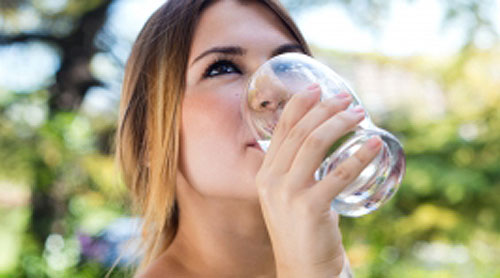 This month a new ‘Switch to Water’ campaign from the New Zealand Dental Association is encouraging Kiwis to ditch sugary drinks to prevent tooth decay.
This month a new ‘Switch to Water’ campaign from the New Zealand Dental Association is encouraging Kiwis to ditch sugary drinks to prevent tooth decay.
Former Silver Fern player Irene van Dyk is backing the campaign to replace sugary drinks with water and says the month-long campaign is a great way for people to start a healthier lifestyle.
‘We know that sugary drinks lead to both tooth decay and contribute to obesity and other health problems,’ she says. ‘By switching to water for the month, we are reminding people that it’s possible to just drink freely available tap’.
Irene says that while it’s difficult to avoid sugary drinks completely, and managing kids consumption can be a challenge for parents, she supports the view of the New Zealand Dental Association that sugary drinks are best as an occasional treat.
‘The everyday drink of choice that’s best for both our bodies and our teeth is the drink that’s cheapest and that’s freely available – water. Certainly during my time as a sportsperson it was really important to stay well hydrated and water is, quite simply, the best way to do that.’
Chief Executive of the New Zealand Dental Association, Dr David Crum says dentists would rather prevent dental disease than try and repair the damage it causes.
‘The problem with sugary drinks is more serious and extensive than just tooth decay,’ he says. ‘There are nine teaspoons of sugar in a can of fizzy drink and even more sugar in a glass of juice. These sugary drinks contribute to tooth decay, obesity and diabetes. With 35,000 NZ children requiring dental extractions due to dental decay annually, we need to really highlight and tackle this problem.’
For more info on the campaign, visit www.healthysmiles.org.nz.
What are sugary drinks?
Beverages with added sugars, such as carbonated (fizzy) soft drinks, energy drinks, flavoured waters, fruit drinks and cordials, sports drinks, fruit juices and flavoured milks and breakfast drinks.
How much sugar do they really have?
On average, a 600ml bottle of fizzy contains more than 16 teaspoons of sugar. This is more than five times the recommended daily intake of sugar for a child. The World Health Organisation recommends a maximum daily sugar intake of three teaspoons for children and six for adults.
Do sugary drinks harm children’s teeth?
Sugary drinks contain large amounts of sugar which dramatically increases the risk of tooth decay. All sugary drinks, including sugar-free or ‘diet’ versions contain acids that irreversibly damages teeth through the erosion of tooth enamel.
Is it okay to drink fruit juice?
Even unsweetened natural juices contain sugars and acids, so if you are thirsty, it’s better to drink water. The main problem with fruit juice is that it contains no fibre and is very high in sugar. It’s best to eat your fruit.
What about sports drinks and energy drinks?
Energy drinks and sports drinks contain as much sugar as fizzy drinks. The Ministry of Health and Health Promotion Agency state that energy drinks should not be consumed by children or adolescents and routine consumption of sports drinks should be avoided.
Are diet drinks okay?
Although diet beverages contain no calories, they have a high acid content which harms teeth. They have the potential to displace water and milk which are the best drink choice for children. They also maintain a desire for sweet food and drinks.
What are the other health effects of drinking too many sugary drinks?
The consumption of sugary drinks has been linked to obesity, type two diabetes, heart disease and hypertension. For children and youth, an increase of one serving of sugary drinks per day increases the odds of being obese by 60%. One can a day leads to a 25% greater risk of developing type two diabetes compared with people who rarely consume such drinks.
Is obesity really a problem in New Zealand?
Ministry of Health figures show that one in three children (2- 14 years) is either overweight or obese. The World Health Organisation has long identified major links between childhood obesity and chronic diseases in adulthood.
Why single out sugary drinks?
Sugary drinks are different from food in that they are consumed in massive quantities, have no nutritional value, and are clearly linked to obesity and type two diabetes. Additionally, unlike other foods with sugar, sugary drinks don’t make us feel full. Sugary drinks are the number one source of added sugar in the New Zealand diet.
What are the best drinks?
Water is the best drink. For children of all ages, water and milk are the best choices. As well as having zero calories, water is a no-sugar thirst-quencher. Milk contains calcium, and contributes to a child’s daily calcium intake.
Image / FreeDigitalPhotos.net – nenetus

